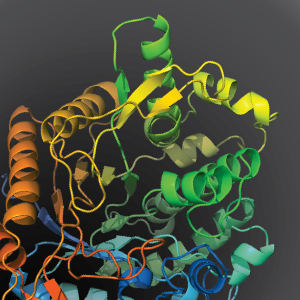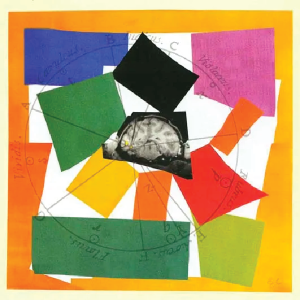Speaking of Science Podcast
Speaking of Science is a podcast that peeks behind the curtain to hear the stories of science in the making. Host Diego Arenas chats with world-leading investigators across NIH’s Intramural Research Program (IRP) about the innovative ways their biomedical research is tackling the challenges facing human health today.
Latest Episode

The Puzzle of Precocious Puberty
The average age for the start of puberty has been dropping for decades. It’s a global trend that could be signaling a public health threat to the physical and psychological development of younger, more vulnerable swaths of the population. Still, there’s no clear culprit for early puberty; it’s a complicated puzzle with many scattered pieces. At the National Institute of Environmental Health Sciences (NIEHS), pediatric neuroendocrinologist Dr. Natalie Shaw has been assembling the pieces together and recently found a new lead hiding in plain sight.
Transcript
>> Diego (narration): I think it’s time we talk about puberty. Don’t worry though, I don’t mean about the birds and the bees, but about how puberty is happening earlier and earlier.
[COMPUTER MOUSE CLICK]
>> News anchor 1: Girls in America are reaching puberty earlier.
[COMPUTER MOUSE CLICK]
>> News anchor 2: A growing number of girls are now experiencing their first period before the average age of 12.
[COMPUTER MOUSE CLICK]
>> Diego (narration): It’s not a recent trend though. The average age of puberty has been dropping for decades. Between the 1890s and the 1950s, the average age at menarche – that’s the medical term for first menstruation – fell from 17 to 12. The rate has slowed since, but other measures still estimate the age drop in puberty is three months per decade since the 1970s.
[AMBIENT MUSIC FADES IN]
It matters because puberty is a pivotal time in a young person’s development -- hormones rage, bodies change. The way they see the world and the way the world the sees them takes new shape. So when you consider how formative the experience of puberty is, not just physically, but psychologically and emotionally, it’s easy to see how the wrong timing can have disruptive effects well into adulthood. Data shows early puberty can stunt growth, and increase risks of body dysmorphia, depression, substance use and early sexual behaviors.
[AMBIENT MUSIC FADES OUT]
Perhaps more unsettling is that it’s happening on a global scale. Premature puberty could be signaling a public health threat. One that has been affecting swaths of the population for more than half a century and could continue to do so for generations to come.
[LIVELY MUSIC FADES IN]
We don’t really know what’s driving this downward trend in start of puberty. There doesn’t seem to be one singular cause. It’s a complicated puzzle with many scattered pieces. But one scientist at the NIH has been assembling them together and has recently found a new lead hiding in plain sight.
I’m Diego Arenas and coming up on this episode of Speaking of Science, the growing pains of studying early puberty and how the science is developing to come up with an explanation.
[LIVELY MUSIC FADES OUT]
[“SPEAKING OF SCIENCE” INTRO SONG]
>> Diego (narration): Early puberty, or precocious puberty as its sometimes called, is defined by the premature development of sexual characteristics and faster growth. In some cases, it can be the result of genetic conditions or abnormalities in the nervous system, including brain tumors. But those are rare. Most of the time, and especially for girls, the reason for early puberty is idiopathic, meaning it’s unknown.
Because there’s no clear culprit, and because it’s so widespread and happening so fast on a population scale, scientists think that the cause isn’t something inside of us, but rather around us.
>> Dr. Shaw: It's the pace that's occurring at, so our genes just don't change that rapidly. It just doesn't make sense biologically for it to be a genetic change that's effecting, you know, worldwide populations.
>> Diego (narration): That’s Dr. Natalie Shaw.
>> Dr. Shaw: My name's Natalie Shaw, I'm a pediatric endocrinologist and clinical investigator at the National Institute of Environmental Health Sciences, which is a branch of the NIH in North Carolina.
>> Diego (narration): I had a virtual sit-down with Dr. Shaw so she could explain how she’s untangling the web of possible environmental factors that lead to early puberty. Because it’s no easy task. Think of all the things we’re exposed to on a daily basis—the air we breathe…
[WIND BLOWING, LEAVES RUSTLING]
…the water we drink…
[WATER SPALSHING IN A CUP]
the food we eat…
[PILOT LIGHT ON GAS STOVE, UNTENSILS CLINKING, PERSON CHEWING]
…and how different those are from person to person.
>> Dr. Shaw: It's a really hard thing to study, especially when you can't do, you know, interventional studies in healthy kids just because of the ethics surrounding those sorts of studies. So, most of the ways that we've looked at this have been through epidemiological approaches. So, measuring candidate compounds in blood, at specific ages in the kids and then looking at a marker, such as menarche, which is a girl's first period and just looking for associations between those things.
>> Diego (narration): Among the list of compounds Dr. Shaw is searching for in kids’ blood are what are known as endocrine disrupting chemicals, or EDCs. As the name suggests…
>> Dr. Shaw: EDCs are compounds in our environment that can either block or activate the endocrine system.
>> Diego (narration): The endocrine system controls the body’s growth, development, metabolism, and reproduction, and given that all these processes kick into high gear during puberty, it makes sense to look for things that would interfere with the command center.
Plus EDCs have a known track record for causing trouble.
>> Dr. Shaw: There's sort of been like experiments of nature where there's been a population that's been exposed to an endocrine disrupting compound and there's been effects on puberty. For example, like Ken Korach's group, he was previously at NIEHS, but he published a paper showing that tea tree oil and lavender oil exposure, those compounds could cause early puberty or breast development in boys, something called gynecomastia by acting at the estrogen receptor.
>> Diego (narration): Estrogen, you might recall, is a hormone largely associated with female sex characteristics. Just like androgens are hormones largely associated with male characteristics, this includes testosterone. But the truth is, we all produce these hormones. Both the testicles in the male reproductive system and the ovaries in the female reproductive system make androgens. The adrenal glands that sit on top of each kidney regardless of biological sex also produce hormones that affect the rest of the body.[6]
These organs are all cogs in the endocrine machinery. How they work together to balance and regulate hormone activity dictates the physical changes and stages associated with puberty.
>> Dr. Shaw: For girls they pass through different stages of breast development called Tanner stages. And, so, there's Tanner one, which is before there's any breast tissue, to Tanner five, which is, like, the adult breast tissue, and there's similar stages for pubic hair development. And in boys it would be enlargement of the testicles.
>> Diego (narration): But before any of these changes can occur, another part of the endocrine system has to set the wheels of puberty in motion.
Puberty's master switch lies in a small gland of the brain called the hypothalamus. The hypothalamus secretes gonadotropin-releasing hormone, shortened to GnRH, in regular pulses. The constant flow of GnRH is the metronome that signals the rest of the endocrine orchestra to start playing.
[METRONOME]
Its steady beat stimulates the pituitary gland…
[DRUM BEAT STARTS]
…a pea-sized organ connected to the bottom of the hypothalamus, that emits two other hormones in regular intervals: luteinizing hormone and follicle-stimulating hormone. It’s then these two hormones that enter the bloodstream and travel to the sex organs, coaxing the release of sex hormones, including estrogens and testosterone, which you now know kick off the other signs of puberty in the body.
[DRUM BEAT ENDS]
So, to measure the start of puberty and determine how EDCs could be pushing this sequence of events forward, Dr. Shaw had to go to the top of the chain.
>> Dr. Shaw: In the paper that my group recently published, we were looking at how those compounds affect receptors in the brain for things like GNRH or another neuropeptide that act upstream of GNRH called kisspeptin.
Other investigators have focused on the estrogen receptor or androgen receptor, but puberty starts in the brain. And, so, one idea was that these compounds could actually be influencing that signaling cascade, the kisspeptin, GNRH, LH signaling pathway. And, so, there's a mechanism at NIEHS called, the Tox21 Cross-partner Projects, where investigators can apply to work with a team of investigators from NIEHS DTT, which is the Division of Translational Toxicology and NCATS, which is the National Center for Advancing Translation Sciences.
They had this huge Tox21, 10,000 compound library, which consists of everything in our environment where there's at least some evidence that it may be impacting human health and those are things like pharmaceuticals, dietary supplements, cosmetic products. So, that just seemed like a really good place to start.
>> Diego (narration): Using cells that were engineered to overproduce kisspeptin or GnRH receptors on their surfaces, Dr. Shaw and her team tested whether each of the 10,000 compounds could emulate the early hormones of puberty by fitting inside the binding pockets of the receptors and as a result elicit a response.
>> Dr. Shaw: We did those screens several times to make sure there were no false positives. And then we only found, you know, a small group that actually could activate these receptors. And one of those was musk ambrette and that activated the kisspeptin receptor. And so the next set of experiments were more to validate that.
So that's how we started and then we did some confirmatory studies working with another group at NCATS that has another platform where they take stem cells and make human hypothalamic neurons.
[CLICK OF A TAPE RECORDER]
>> Diego (narration): Remember, hypothalamic refers to the hypothalamus—that first gland in the brain that send out GnRH to jumpstart puberty.
[CLICK OF A TAPE RECORDER]
>> Dr. Shaw: So we exposed human hypothalamic neurons to musk ambrette and then looked at gene expression changes. So were there genes that we know when you expose these cells to GnRH, certain genes go up? Or if you expose them to kisspeptin, certain genes should increase. And that's what we were able to confirm in those cells.
And then we also collaborated with Dr. Erica Davis at Northwestern to study the effects of one of the compounds using a zebra fish model. So the zebra fish has a gene, a GNRH gene that's very similar to the human one and this was a transgenic zebra fish line, where the GNRH gene is tagged to a fluorescent protein. And, so, she exposed the embryos to musk ambrette and then looked at the fluorescent area of these GNRH neurons and saw an increase in response to these compounds.
>> Diego (interview): So that would essentially translate to -- if those embryos developed, they would go into puberty earlier or faster?
>> Dr. Shaw: Yeah, I don't know if zebra fish have puberty. I guess they do have sex organs or gonads, so we could look at effects downstream of the increase in GNRH. But it just showed that these compounds were activating the reproductive axis.
>> Diego (interview): So then what is musk ambrette in? Like, what kind of products? What kind of, you know, things that we're exposed to? Because obviously, that's the main concern, right?
>> Dr. Shaw: Yeah. I mean, so there are regulations that should prevent exposure, but I wouldn't say we're 100% protected. You know, you can go and buy whatever you want these days off the internet. So, we really don't know what the exposure levels are in this country. But it's in fragrances. So anything that has a scent could potentially have this compound in it.
>> Diego (interview): Is it something that has been flagged before? Specifically musk ambrette has been shown to have other effects that are, you know, adverse?
>> Dr. Shaw: Yeah. I mean, in mostly, you know, rat studies showing neurotoxicity. A lot of it is very old literature. It was banned by the European Union and it was removed from generally considered safe lists that I think the FDA maintains. But again, no one's going around measuring this, so we don't know what the exposure is like.
>> Diego (interview): What about exposure past puberty, are you looking at those effects at all in terms of how it affects people who have already matured, so to speak?
>> Dr. Shaw: Yeah. Right. No. We haven't done that. I guess it could affect reproductive hormones. But yeah, I think it would be really interesting to first try and measure this in a cohort of children. And if it's there, you know, then do a deep dive into adult reproductive physiology and try and see if it's doing anything there.
>> Diego (narration): More evidence is needed to definitively conclude musk ambrette is contributing to the phenomenon of early puberty, but it joins the list of potential factors that could be putting kids are risk. Number one on that list is obesity.
Puberty requires a lot energy to carry out all the changes that take place. So as a child grows, their body naturally starts to accumulate energy stores in the form of body fat. One hypothesis is that with obesity on the rise, more kids are gaining excess body fat at younger ages fueled by readily accessible high-calorie, low-nutrient diets, and as a result their bodies are telling their brains that it’s time to start puberty earlier.
>> Dr. Shaw: This phenomenon had been described even as early as, like, the 1970s, this association. There was not an obesity epidemic, so this was just kind of an interesting observation. But the obesity problem is interesting because we see breast development happening earlier, but then menarche kind of staying around the same. So for some reason puberty seems to be happening earlier, but taking a longer time to complete, if we're going to say menarche is the end or one of the ends of puberty.
>> Diego (interview): Oh, interesting. Does that suggest anything about, like, the synchronicity of this early onset puberty, how it effects different parts of the body at different rates?
>> Dr. Shaw: Yeah, that's a good question. I think people have proposed and I haven't found evidence for this, that in obesity the fat cells are making estrogen and, so, they're causing the breast development, because the breast is very sensitive to even very low doses of estrogen, but that maybe the brain is less affected by that and is kind of taking longer to mature.
In my studies, we've found when we've looked at overweight or obese girls, we see that the brain hormones that we can measure, like luteinizing hormone, those are increased just like normal-weight girls, suggesting that's why the menstrual cycles take longer to achieve. So it's not entirely clear and it also seems to depend on how obese. So if you have mild obesity, that might lead to earlier puberty, whereas severe obesity might actually delay it, and we don't know what the consequences of that will be.
>> Diego (narration): The science explaining how exactly obesity and EDC’s affect puberty is still coalescing, so further research is vital, especially when the long-term health consequences of ill-timed puberty are so clear.
>> Dr. Shaw: There's like no good association of having early puberty. In girls with extremely early puberty or clinically precocious puberty as defined as breast development before age 8 in a girl, which is really early and typically they would have their first period before age 10 if breast development is happening that early. When you're exposed to estrogen that early, you end up much shorter, because you'll initially have a growth spurt, but then estrogen will actually close the growth plates. Especially in a family that, you know, the parents are not very tall and the girl is on the lower percentiles of the growth curve, that can be an important consideration.
And then in the general population there are a lot of epidemiological studies showing that earlier age at menarche or the first period is associated with increased risk of breast cancer, diabetes, obesity, and then there's a lot of psychosocial ramifications, as you can imagine.
>> Diego (interview): Yeah I would think that, like, developing earlier physically kind of thrusts you into situations where you're forced to develop mentally and just because the part of your brain that controls your physical attributes is developing faster, doesn't mean, the more maybe higher function part of your brain is doing the same.
>> Dr. Shaw: Right, I think there is a big disconnect there for girls and they're often treated as being older or they're -- there's a greater risk of depression, anxiety, being the victim of sexual abuse. Yeah, so, it's very concerning.
>> Diego (interview): By the way things are going, are folks in your field, predicting puberty will keep happening earlier and earlier, because I'm already stunned hearing kids going through puberty at, like, 8 or 9, I dread thinking about it happening at 6 or 7.
>> Dr. Shaw: Yeah, I don't know that we've had those conversations to be honest. We know some about what activates puberty and there's also one gene that was recently discovered that acts as a break on puberty and that's called MKRN3. But I don't know how the environment influences those activators, versus inhibitors and, so, where is that balance and how early could things really shift. That's an important question, but, yeah, we don't know.
>> Diego (interview): Speaking of things that kind of slow down puberty, are there discussions about mitigating early puberty with puberty blockers?
>> Dr. Shaw: Right. So, those are really only approved for the extreme cases where girls are showing breast development before age 8. I would say there's got to be a really good reason to use that in an older girl. I mean, certainly in girls with developmental delay where there's concerns about hygiene or potentially the child being taken advantage of, that might be a scenario where those get used. But I would say those are very safe drugs and we know that when you remove them the axis restarts and those girls become women that have regular menstrual cycles and have no problems with fertility, but when you're dropping estrogen levels, there can also be affects on bone mineral density, so it's something you have got to be careful -- can't continue it any longer than it's necessary.
[PENSIVE MUSIC FADES IN]
>> Diego (narration): In a field that is often understudied and underfunded, Dr. Shaw’s research underscores the value studying puberty offers as a public health indicator writ large. It’s a canary in the coal mine alerting us of broader environmental changes and possible dangers to the younger, more vulnerable members of the population. But to understand the canary’s song we need scientists like Dr. Shaw who are attuned not just to the sound, but the silence.
[PENSIVE MUSIC FADES OUT]
Because in science, the absence of something can almost tell us as much as the thing itself.
>> Diego (interview): Well, I also wanted to ask you, because you're not just studying cases where puberty's happening earlier, but instances where it actually never comes. What’s the story there?
>> Dr. Shaw: Yeah, so, I did my research training as part of fellowship at Mass General, where they have a reproductive endocrine unit and they specifically study patients with delayed or absent puberty. And they've done a number of genetic studies, like, one of those studies was what led to the discovery of kisspeptin, because they came across a patient with a mutation in the kiss 1 gene that encodes that protein. But while I was there I encountered a patient who had not gone through puberty, was in her 20s and never had a period, and she also had some other interesting features, so she was blind with small eyes, a condition called microphthalmia, and she had been born without a nose and that's called congenital arhinia or absent nose.
The reason that these patients without a nose don't go through puberty is that the GNRH neurons are born in the primitive nose and they migrate into the hypothalamus along the axons of smell neurons. This sort of association between the olfactory or smell system and reproductive system was known. I was just really intrigued by that and I started digging through the literature and decided I wanted to try to find more cases like that. So, I collaborated with colleagues in genetics and other pediatric endocrinologists and was able to put together an international cohort of about 25 of those patients.
That was actually around the time that I was recruited to NIH and I was encouraged to open a wet lab, I didn't have any wet lab experience, like, since my undergrad days. But they gave me resources and I was able to hire this amazing staff scientist, Dr. Inoue, who I still work with. And, yeah, I started studying patient cells and collaborated with the x-ray crystallography core and they helped us solve the crystal structure of part of the protein. So, yeah, it's just been amazing being at NIH, like, in that moment it was the perfect place to be.
By studying patients in the lab, we discovered this gene, gene SMCHD1, which is an epigenetic repressor, meaning that it turns off other genes during development. So the nose didn't form properly, because when you have a mutation in this gene, there's actually -- it doesn't repress another gene, that is toxic to those early nasal cells. And, so, basically the nose doesn't form and then the GNRH neurons die off.
>> Diego (interview): What did those patients kind of describe to you, like their daily lives. I don't know what it looks like to not go through puberty, much less what it feels like, so what kind of conversations did you have?
>> Dr. Shaw: Yeah. So puberty was really not a big part of their lives actually. They are amazingly resilient people, like, they're, I mean, extremely intelligent.
>> Diego (interview): Oh, so there's no cognitive impairment?
>> Dr. Shaw: No.
>> Diego (interview): None.
>> Dr. Shaw: It's really just the nose and sometimes the eyes. I've talked to some of them -- a lawyer, valedictorian for his school of the blind, and they've all gone on, you know, they've formed families by adopting kids. I'm actually writing a paper with a UK psychologist who specializes in patients with facial malformations and resilience in those patients. So, yeah, they're an amazing group of people.
[SLOW THOUGHTFUL MUSIC]
>> Diego (interview): It’s with their help and contributions to her studies, that Dr. Shaw is able to fit specific pieces in the broader puzzle of puberty.
>> Dr. Shaw: I mean, I think studying these patients is how we learn about human embryology and human development. These mutations in these genes happen in very rare patients, but a lot of these same genes show up in genome wide association studies for age at menarche in the population. So they're not just affecting these patients, they're telling us that this system is involved at a population level in determining the age of puberty.
[END]
More Episodes
Filter by category
- Lungs
- Senses
This page was last updated on Wednesday, September 11, 2024










